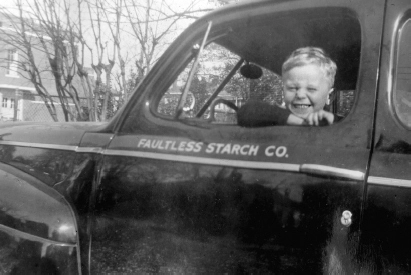But it couldn’t last. Problems mounted. Hotel rooms, the places they’d always eaten, car problems. Predictable baby troubles. Finally, the decision they’d made before I was born, about the days he’d be away, the days we’d be at home—these would have to be honored.
And how was it for him? Driving, driving alone? Sitting in those hotel rooms, in lobbies, reading a strange newspaper in the poor lamplight; taking a walk down a street in the evening, smoking? Eating supper with some man he knew off the road? Listening to the radio in the sweep and hum of an oscillating fan. Then turning in early to the noise of katydids and switch-yards, car doors closing and voices on the street laughing into another night. How was it being a father this way—having a wife, renting a house in a town where they knew almost no one and had no friends, coming home only weekends, as if this were home?

Richard, Jackson, Mississippi, 1947
It could only have been strange. Though possibly he might also have felt competent for the first time. Independent. Finally prepared for life. Approaching forty. A parent. He was not the kind of man to regret much or to take his temperature, or to look over his shoulder at what had once been different. Instead, he was the kind of man to know how he’d worked things out up to then, and to let that be. He knew he was mostly absent. He knew she was looking after their life and me, and that it was complex for her. He was a presence, if not a father precisely. And he was her husband, the man she loved and waited for. It was acceptable. And it was how their life would now go on—at least until his heart attack in 1948, the one he wouldn’t die from, but the point at which everything changed again, when death and the fear of it became his familiars, and my mother’s, too.
AN ONLY CHILD ABSORBS A GREAT DEAL—possibly more if his parents are older. An only child’s imagination is strummed melodically by the things they say and don’t say. I have always said and still believe my childhood was a blissful one. But that is not quite to say that life was normal. Their age wasn’t normal for having a first child. Even in their view it wasn’t. There was, unspoken, the sense that they should’ve been younger, or I should’ve been born fifteen years before, when they were new. I grew up feeling I should be older, or was older. There had already been so much important life before me—of which I knew little, and that to them did not bear talking about since it did not include me. I have no memory of either of them saying—as I grew older—“Richard, do you remember?” Or, “Richard, once, your father and I. . . .” What they talked about and what was in the air was only the present, interrupted by the long times between Monday and Friday. These absences made their closeness to each other even more paramount, since together was where they’d always, only been.
1 comment